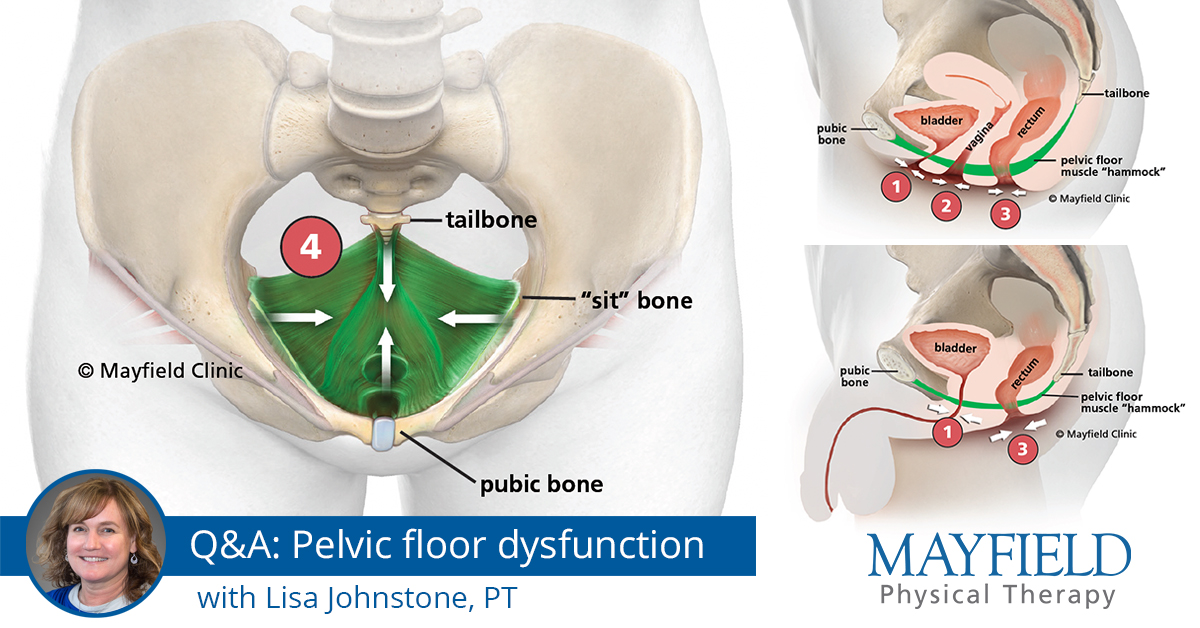Q&A: Pelvic Floor Dysfunction with Lisa Johnstone, PT, PRPC
Q: Where are the pelvic floor muscles?
A: The pelvic floor muscles line the bottom of the pelvis, a bony bowl that connects the trunk of your body to the legs. The pelvic floor spans from the pubic bone to the tailbone. These muscles support the pelvis and the spine, plus the pelvic organs – bladder, uterus, prostate and rectum. They are important for bladder and bowel control and sexual function.

Q: What is pelvic floor dysfunction?
A: When the muscles that line the bottom of the pelvis are too tight or too weak, it can cause a variety of symptoms. These symptoms might include pelvic pain or different bowel and bladder problems, including urinary or fecal incontinence, incomplete emptying or constipation. Like any muscle, the pelvic floor can be injured or become weakened over time. Also like any muscles, the pelvic floor can gain strength and become more flexible and functional.
Q: How do I know if I have pelvic floor dysfunction?
A: Any problem with your bladder or bowel function, or any pain in the pelvic region, could indicate a problem with your pelvic floor muscle.
Q: What causes pelvic floor dysfunction?
A: There are various health issues that cause muscle weakness or tightening. They affect the pelvic floor in the same way. Causes could include injury to the pelvic floor through pregnancy, labor and delivery; obesity ; repeated heavy lifting; or straining due to chronic constipation. Surgery or infection also can cause some of these issues. Also, natural hormonal changes or increased tension, stress and anxiety can be a factor.
Q: How do you treat pelvic floor dysfunction?
A: Your primary care doctor might recommend that you see a specialist, such as a urologist or a urogynecologist. Customized physical therapy is often a first step in treating pelvic floor dysfunction, focusing on strengthening and relaxing the muscle through exercises and manual techniques. Medications can provide pain relief and time for muscles to heal. They also can improve bladder and bowel functions. In severe cases, surgery may be necessary.
Q: What is involved in pelvic floor physical therapy treatment?
A: Much of the evaluation and treatment will be similar to traditional physical therapy. You will work on range of motion of the hips and legs, diaphragmatic breathing, pelvic mobility and core strength. Your pelvic floor physical therapy team will review the basic anatomy and conduct a pelvic floor muscle evaluation. The patient will undress from the waist down and cover with a sheet. This evaluation is comparable to a gynecological exam for women or a prostate exam for men. It is a one-on-one, specialized evaluation in a private treatment room.
Q: Is there anything I can do to prevent pelvic floor dysfunction?
A: Making sure you are leading a healthy lifestyle is the best defense against pelvic floor problems. As is true with many spine disorders, you should maintain a healthy weight and avoid heavy lifting that might cause injuries. Avoid straining with urination and defecation that can injure the pelvic floor muscle. Healthy hygiene around bladder and bowel habits can help. You should seek treatment for incontinence, urgency, frequency, chronic constipation and pelvic pain, particularly if those symptoms are increasing in intensity.
Disclaimer
The information in this Q&A is not intended to be a substitute for professional medical advice, nor is it intended to serve as medical diagnosis or treatment. The information is presented for the sole purpose of disseminating health information. It is not intended and must not be taken to be the provision or practice of medical, nursing, or professional health care advice or services in any jurisdiction. Always seek the advice of your physician or other qualified health provider if you have questions regarding a medical condition, and always seek the advice of your physician or provider before starting any new treatment. The information about drugs contained in this Q&A is general in nature and is intended for use as an educational aid. It does not cover all possible uses, actions, precautions, side effects, or interactions of these medicines. As such, the information is not intended to serve as medical advice for individual problems or for making an evaluation as to the risks and benefits of taking a particular drug.

Lisa Johnstone, PT, PRPC specializes in pelvic floor rehabilitation.
Mayfield Physical Therapy's pelvic floor specialists are currently seeing patients at our Anderson, Crestview Hills, Green Township and Springboro locations.
Make an appointment >


